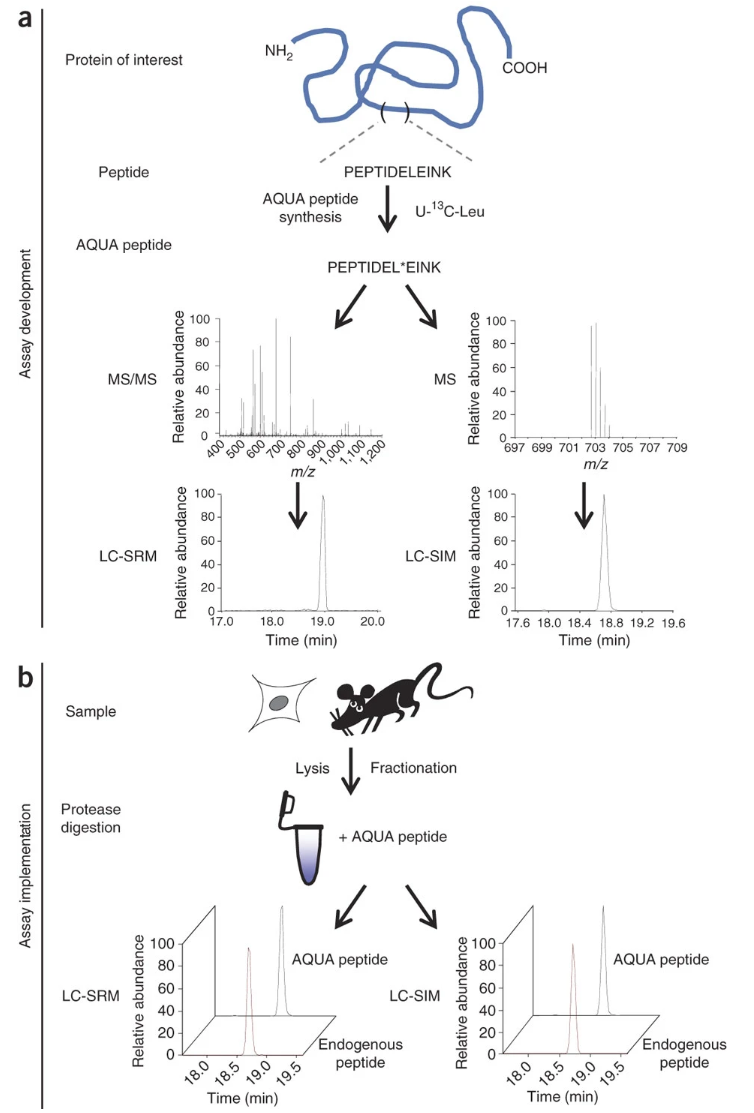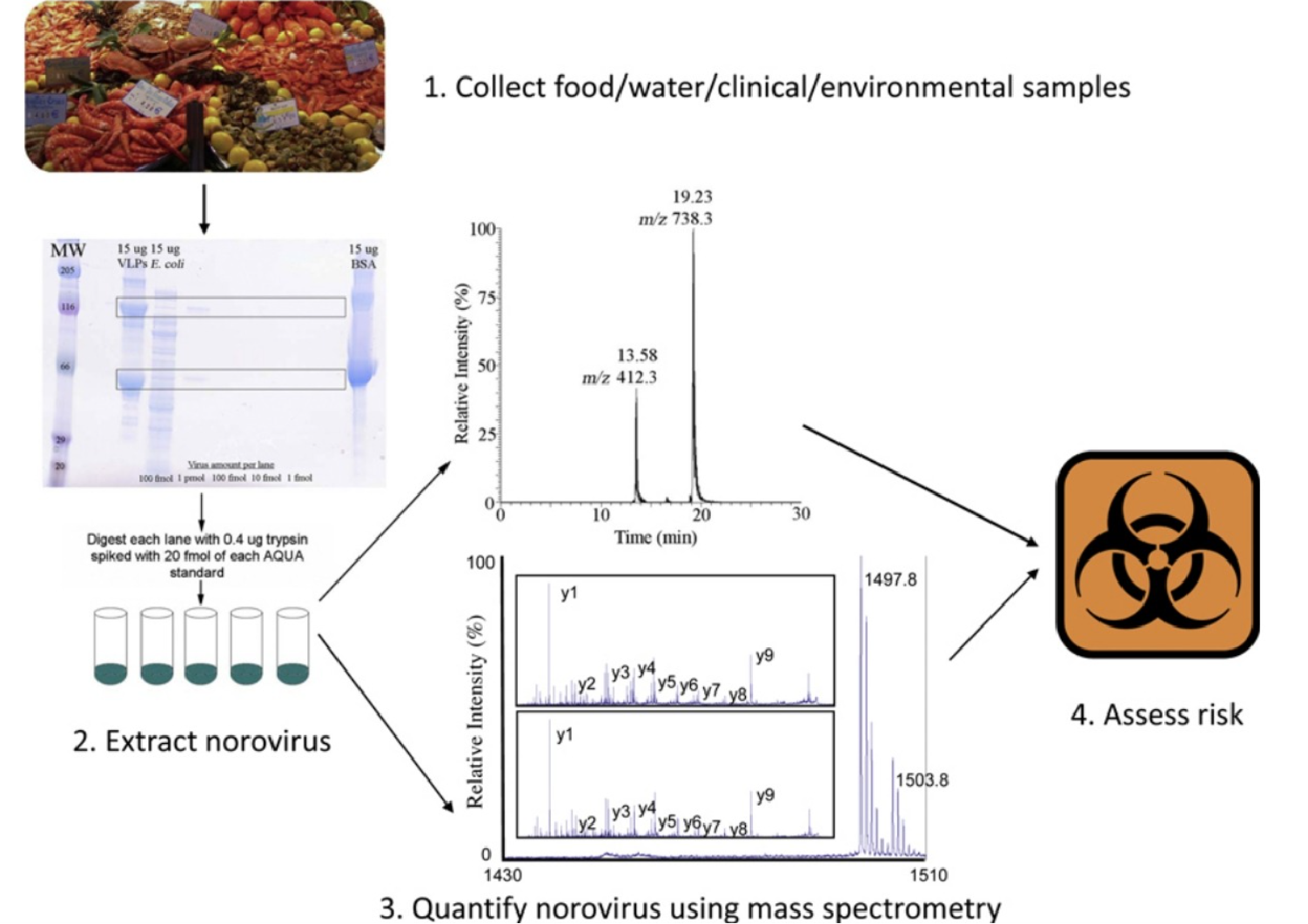AQUA Proteomics Service
AQUA Proteomics is a robust and precise technique used for the absolute quantification of proteins and peptides in complex biological samples, utilizing isotope-labeled internal standard peptides (ILISP) in combination with Liquid Chromatography-Mass Spectrometry (LC-MS). The AQUA Proteomics method works by adding a known quantity of chemically synthesized ILISP to a sample during proteolysis. The ILISP is designed to mimic the native peptide of interest, sharing identical amino acid sequences and physicochemical properties, such as chromatographic retention time and ionization efficiency. The key distinction between the native peptide and ILISP is the mass difference caused by the isotopic labeling (e.g., using isotopes such as ¹⁸O, ¹³C, or ¹⁵N). This mass shift enables the differentiation of the two peptides during LC-MS analysis. The relative abundance of both peptides is detected, and by comparing the peak areas, the concentration of the native target protein is accurately quantified. AQUA Proteomics also allows for the quantification of post-translational modifications (PTMs) by incorporating synthetic peptides with covalent modifications such as phosphorylation, acetylation, or methylation. This ability to quantify both protein expression and PTM levels makes AQUA Proteomics an invaluable tool in functional proteomics, clinical research, and drug development.
Service at MtoZ Biolabs
MtoZ Biolabs offers a comprehensive AQUA Proteomics Service designed to provide precise and reliable absolute quantification of proteins and peptides in complex biological samples. Utilizing advanced LC-MS platforms and optimized AQUA protocols, our service enables accurate measurement of protein expression levels and the quantification of post-translational modifications (PTMs) such as phosphorylation, acetylation, and methylation. Our AQUA Proteomics Service is ideal for a wide range of applications such as clinical biomarker discovery, protein function studies, and drug development. Whether you are investigating protein dynamics in tissues, plasma, or cell lysates, our service provides the high sensitivity and accuracy needed for both research and clinical studies. Free project evaluation, welcome to learn more details!
Analysis Workflow
Our AQUA Proteomics Service workflow includes:
1. Peptide Selection: Choose an optimal tryptic peptide from the protein of interest’s sequence.
2. AQUA Peptide Synthesis: Synthesize a stable isotope-labeled peptide as an internal standard.
3. LC/MS Optimization: Optimize the LC-MS analysis conditions to effectively separate and identify AQUA peptides.
4. Sample Preparation: Add the synthesized AQUA peptide to the protein lysate from the biological sample.
5. Digestion and Analysis: Perform trypsin digestion followed by LC-MS/MS or MALDI to analyze the peptides.
6. Quantification and Data Analysis: Quantify proteins by comparing the intensity of AQUA peptides with native peptides in the sample, and conduct detailed analysis based on full-scan data.

Figure 1. Scheme of AQUA Proteomics Workflow
Service Advantages
1. High Sensitivity and Specificity: By utilizing stable isotope-labeled internal standards, the AQUA Proteomics Service enables the detection of low-abundance proteins, overcoming challenges posed by background noise in complex samples.
2. Comprehensive Profiling: AQUA proteomics allows for the analysis of not only protein abundance but also the quantification of post-translational modifications (PTMs), providing a deeper understanding of protein functionality and regulation.
3. Customization for Specific Targets: Tailored AQUA peptide assays can be developed for specific proteins or protein families, making this service highly adaptable to various research needs, from biomarker discovery to drug development.
4. Compatibility with Diverse Sample Types: The AQUA Proteomics Service is suitable for a wide range of biological samples, including cell cultures, tissue lysates, and bodily fluids, ensuring broad applicability in both clinical and preclinical studies.
5. Reproducibility and Reliability: AQUA proteomics delivers highly reproducible results across different sample types and experimental conditions, ensuring robust data for hypothesis testing and validation.
Applications
1. Biomarker Discovery
Enables accurate identification and quantification of potential biomarkers for disease diagnosis and therapeutic development using AQUA proteomics.
2. Protein Dynamics
Tracks protein abundance and post-translational modifications (PTMs) over time to understand cellular processes and responses.
3. Clinical Research
Assists in the quantification of proteins and biomarkers in clinical samples, providing insights into disease mechanisms and therapeutic interventions.
4. Drug Development
Supports the development of drug candidates by identifying and quantifying target proteins and evaluating their modification levels using AQUA proteomics.
5. Functional Proteomics
Facilitates the understanding of protein functions and interactions by quantifying target proteins and their changes in different conditions.
Case Study
This study demonstrates the use of AQUA Proteomics Service for the precise and sensitive quantification of norovirus genogroup I capsid proteins in environmental samples using stable-isotope labeled peptides.

Hartmann, E. M. et al. J Hazard Mater. 2015.
Deliverables
1. Comprehensive Experimental Details
2. Materials, Instruments, and Methods
3. Total Ion Chromatogram & Quality Control Assessment
4. Data Analysis, Preprocessing, and Estimation
5. Bioinformatics Analysis
6. Raw Data Files
How to order?







